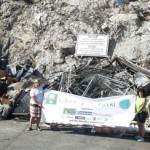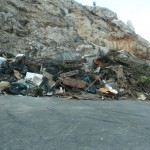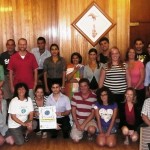VOLUNTEERS CONCERNED ABOUT VOLUME OF WASTE AT SEVEN SISTERS
Last weekend a group of dedicated volunteers carried out a second Clean up at Seven Sisters Beach and filled another three skip loads of rubbish from this challenging bit of Gibraltar’s coastline. An initial three skips had previously been collected by teams during the recent Clean up the World weekend.
For years the area in question has seen the tide dump incalculable quantities of lightweight, polystyrene and plastic bottles (several feet deep!) onto the raised ground beneath the great sea walls on a patch of shore line known as Seven Sisters. The area, as it stands today, is still covered in layers of plastic waste and as such presents a very real threat to marine life, not just in the Bay, but out in the world’s oceans..
After this latest clean up we think its important to raise awareness about this environmental problem. Clearly, birds, fish, turtles, dolphins etc. are at risk as they often mistake small pieces of floating plastic/polystyrene as plankton or other food sources and can be indiscriminately starved and poisoned. Polystyrene packaging in particular breaks down quite quickly into small particles the size of plankton and is easily confused as food so this is a real danger. (See homepage ESG website for short research video on this issue).
While our 18 volunteers rapidly filled over 150 large black sacks of bottles and polystyrene during a four hour period we by no means collected all that was there. The ESG and other volunteers urge the Gibraltar Govt to please complete the job and take appropriate measures to remove the remaining rubbish using whatever means at its disposal. The ESG will be contacting Govt directly about this.
Whatever happens the team of volunteers intend to re-visit the area early next year to monitor the situation and continue clean ups if need be. The ESG is grateful to GibDock for providing crane support, to the MoD for enabling access with their vessel, and to Gibraltar General Services Limited for assisting in skip removal.
The volunteers did an amazing job and ultimate thanks go to them.
See Flickr link on Home Page for photos of Clean up







